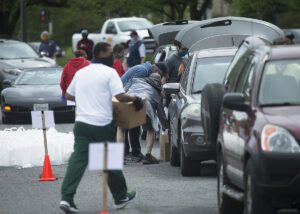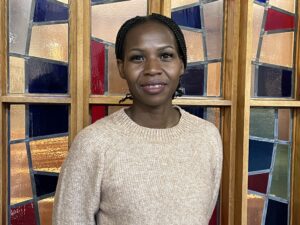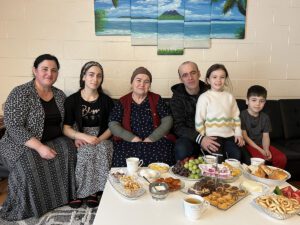(OSV News) – Catholic social teaching has widely been described as “the church’s best kept secret.” A recent report indicates that may still be the case, and that efforts to spread it may be thwarted by a reduction in diocesan positions dedicated to social action.
A report from the Loyola Institute for Ministry at Loyola University New Orleans titled “Advancing the Social Mission of the Catholic Church” indicates that while most of the people polled are familiar with Catholic social teaching, they have encountered little information about it from their parishes, dioceses or among fellow U.S. Catholics.

The U.S. Conference of Catholic Bishops describes Catholic social teaching as the church’s “wisdom about building a just society and living lives of holiness amidst the challenges of modern society,” and organizes it into seven main themes: life and dignity of the human person; call to family, community and participation; rights and responsibilities; option for the poor and vulnerable; the dignity of work and the rights of workers; solidarity; and care for God’s creation.
In the spring of 2020, the Washington-based Catholic Roundtable Association of Diocesan Social Action Directors received a grant from the USCCB’s Catholic Campaign for Human Development. The Roundtable collaborates with the USCCB Department of Justice, Peace and Human Development, and partners with Catholic Charities USA and Catholic Relief Services.
The USCCB funding enabled the Roundtable to research two primary areas of concern: “the perceived diminishment of diocesan staff positions around the U.S. whose primary responsibility was the promotion of Catholic social teaching and social action” and “the level of understanding and awareness of Catholic social teaching among the clergy, religious and laity in the U.S. Catholic Church.”
The Roundtable commissioned the Loyola Institute for Ministry to conduct research via two surveys. The first, in 2021, surveyed Roundtable members, attendees at its Social Action Summer Institute, diocesan parish social ministry employees, and others identified by the Roundtable and CCHD, and also included 19 additional interviews.
Results from 311 survey respondents indicated around 90% of those polled said they are familiar with Catholic social teaching. But when asked whether they perceived other Catholics to be familiar with this teaching, respondents placed that knowledge at slightly over 20% for Catholics in their parish, a bit less than 20% for Catholics in their diocese and less than 10% for Catholics nationally.
Slightly less than half of respondents to the first survey said their diocese is committed to promoting action on behalf of Catholic social teaching’s themes. About 45% reported observing a reduction in local social action offices.
“It’s really a confirmation of what’s been pretty palpable for most of us in this kind of ministry across the country — and that is, we know anecdotally that many of our peers are losing their roles,” said Kevin Fitzpatrick, Roundtable board chairman.
“Either the offices are being shut down by the diocese, or there’s attrition: They (social action directors) will resign and retire, and then that role will not be refilled,” Fitzpatrick said. “Or, an office will be merged with something else.”
While that means fewer members in the Roundtable’s association, he said, “the larger picture for the Catholic Church is how do we offer this kind of support for Catholic social teaching in our parishes, our dioceses, and our schools if people who are steeped in it and have a background in education are not available widely throughout the country?”
The bishops appear to be aware of reduction in social action ministry, he said, “but, for whatever reason, they don’t seem mobilized to address this issue.”
The second survey was conducted in 2022 among laypeople, deacons, priests, vowed religious men and women, and seminarians in the Archdiocese of New Orleans. That archdiocese was selected because of its vocational diversity, according to the report’s author, Thomas Ryan, professor of theology and ministry at Loyola University’s Institute for Ministry.
That survey received 812 responses. “One of the things that really stuck out to me is the majority of respondents in every category said they were familiar with Catholic social teaching,” Ryan said.
At the cumulative archdiocesan level, more than 70% of respondents said they are familiar with Catholic social teaching, feel it influences their faith and that it affects how they live. However, the extent to which this teaching is fully understood is an open question.
“I kind of doubt that everybody who responded to the survey knows the technical history and terminology of Catholic social teaching,” Ryan said. “But I think what this at least reflects is that people know that their faith has social implications, and that those social implications affect their faith and how they live. … I was surprised that overall, there was such a strong familiarity.”
That familiarity, however, was not gained from Sunday homilies. When asked, “Is Catholic social teaching a regular feature of the Masses I attend?” the majority of respondents said no, Ryan said. The response was the same when asked if Catholic social teaching was a regular feature of parish life beyond Mass.
“Some of the conclusions I would draw from that is people are interested in the social implications of their faith and know about that, but are interested in learning more,” Ryan said. “There’s opportunity for growth in the Masses that people attend, and in parish life in general.”
With little parish emphasis on the church’s social doctrine, the applications of this teaching are at risk of being purely theoretical, he said.
“Catholic social teaching can’t just be for a certain group of people, or it can’t just be confined to an intellectual endeavor,” Ryan said. “People recognize it’s not purveyed in Masses, it’s not woven through parish life. It really needs to be an integral part of the practice of our faith — our sacramental life, our faith formation life, our communal life.”
Of the seven themes of Catholic social teaching, or CST, life and dignity of the human person was the area where respondents in the New Orleans Archdiocese devoted their most time and effort, while respondents to the first survey devoted most of their time and effort to preferential treatment of the poor.
Both surveys also identified the dignity of work and rights of workers as the theme of this teaching that is most overlooked in the church today.
The executive summary of the report, which was released in June, includes a photograph of a sign from St. Patrick Parish in Scottsdale, Arizona, that reads: “The Mass Must be Lived, Go Forth to Love and Serve the Lord.” The report’s recommendations pointed to this image, stating, “CST is integral to Christian faith, worship, and parish life. Without it, each of these is diminished. CST should be woven into all aspects of parish life and worship.”
Other recommendations included: “The Church should be attentive to CST themes that tend to be neglected and the challenges they pose personally, ecclesially, and socially,” and “the faithful should recognize how political language (left-right, conservative-liberal) can trigger in the Church the kind of partisan divisions that exist in the political arena. They should find less politically charged, more theologically informed language and employ generous and effective listening skills in discussions of CST.”
Archbishop Gregory M. Aymond of New Orleans told OSV News he is pleased the report is raising awareness of Catholic social teaching in his archdiocese and elsewhere, and said he is grateful to the contributing organizations “for helping to keep Catholic social teaching in the forefront of our minds and hearts in the life of our church.”
Ryan said the survey results are intended to provide encouragement.
“I’d like to see this report as an invitation — not as a hammer or a club to say, ‘You’re not doing this right,'” he said. “How might this report help all of us on our journey? The life of faith is a pilgrimage. This report doesn’t have all the answers, but it’s an invitation to continue that journey towards, by grace, sharing God’s very life.”
Catholic social teaching can “contribute to the work of forming all the faithful as missionary disciples — people sent out into the world to announce the Gospel,” he said.
Ryan also thinks stronger emphasis on the church’s social teaching might draw nonpracticing Catholic youth and young adults back to the church and help them evangelize others.
“We have this gift to share with the world,” Ryan said. “It’s integral, and without it in some ways, our faith is diminished.”









